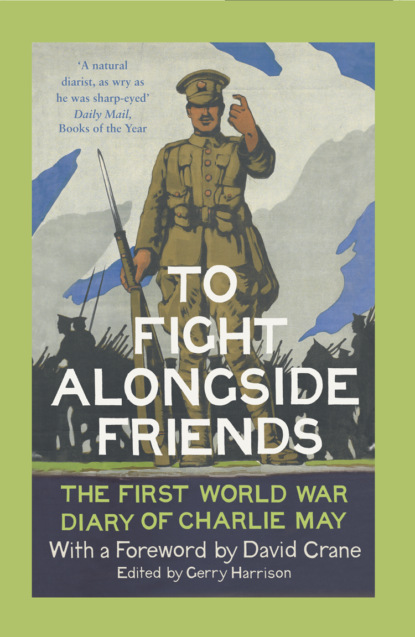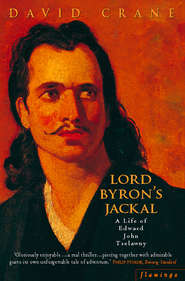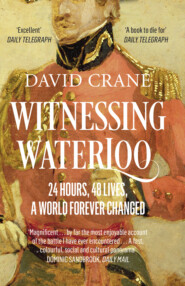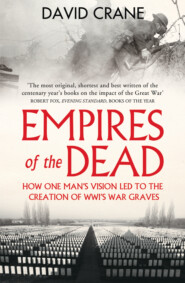По всем вопросам обращайтесь на: info@litportal.ru
(©) 2003-2024.
✖
To Fight Alongside Friends: The First World War Diaries of Charlie May
Настройки чтения
Размер шрифта
Высота строк
Поля
and I have been to Amiens, bought some tobacco and indulged in a civilized lunch off a clean table-cloth. How one appreciates such little things after one has been denied them even for the short time we have.
Amiens, as a city, we were not impressed with, its cathedral, as a cathedral, we were – greatly. It is indeed a lovely edifice and one which I sincerely trust may be spared the fate of Rheims. Its altar and rose windows I can recommend to any man who has an hour to spare and desires elevation of the soul.
If he also desires bodily comfort he may go to the Hôtel de la Paix, lunch there and come away satisfied. It was some lunch they gave us and I record it amongst my choicest memories. Worthy ran very near to making a beast of himself on it and the waiter was obviously relieved when at length we called for the bill. Three francs fifty perhaps did not leave a great margin of profit when two hungry devils like us are suddenly introduced to a lunch. But, even so, I do not think a really properly trained garçon would display palpable relief at its termination. I can only think, therefore, that the French have engrained mercenary instincts.
21st November ’15
A day of slight disaster. The field cashier was at Brigade HQ for officers to draw what pay they could. We all requisitioned, but when Bland came back he had everyone’s cash but B Coy’s. The reason is that we sent in the wrong form. I had somehow taken it down incorrectly. How, I do not know; but it is most distressing and all the more so since it reduces us to the painful necessity of borrowing from the more fortunate others. This we have done with success and are now suffering from an excess of sorrow – for those who have trusted us.
22nd November ’15
Another uneventful day so far as general interest is concerned. Just the usual Brigade Route march for the battalion during the day and the usual unfruitful tour round the byways after dark in search of wood for the fire at which we are wont to thaw our feet before retiring. It is not our fault that we take the spare wood of the village in this clandestine fashion. One must be warm. That is unanswerable. Yet the people are so constituted that they will not sell their beloved bois. Then, what would you? To see an otherwise honest and respectable English gentleman, sneaking stealthily from one shadowy wall to another and flitting swiftly across the open spaces where the moonbeams flicker, with a large and cumbersome fence post under his arm, is not a sight one of a strict moral rectitude similar to my own, can look upon with equanimity, but when one is reduced to a choice between witnessing it or enduring the sensation of slowly freezing from the feet up, not to mention the other minor disadvantage of becoming the possessor of an enduring dew-drop, one is liable to find oneself weak. And certainly I confess that as the flame leaps joyously upwards from our stolen fuel it thaws into non-existence the last ice of my own honesty.
23rd November ’15
It seems to me that one or two little remarks of the men, heard en passant, are worthy of record here and today seems propitious for writing them down, there being an absence of news more suitable for inclusion in this my notebook.
One fed-up one, writing home, expresses his opinion of this fair land thus, ‘I can’t imagine why the Germans want this country. If it was mine, I’d give it to them and save all the fuss.’ Evidently a man of personality that, a man who judges from what he sees rather than from what he hears.
Overheard near the cooker, ‘Well I hopes as how they’ll fight the next blinking war in England and give a swotty a “chanst” to do the decent by hisself.’
The next was in answer to a young fellow who was grousing at the food, which is excellent and, for active service, plentiful. ‘Rotten grub! You don’t know you’re alive. I once lived on potatoes for a fortnight, and got worms.’ The relevance of the penalty may not be quite apparent but the retort had the wholesome effect of silencing the grouser, and of adding to the gaiety of the remainder of the assembly and must therefore be appreciated for its efficacy.
We had our first dose of gas this afternoon – and are somewhat disappointed. It is not at all exciting. One merely pulls on a helmet, which smells abominably and which causes an otherwise decent battalion to at once assume the aspect of horrible ogres near which it would be criminal to bring any highly strung infant, and walks solemnly through a house filled with a yellowish atmosphere.
There is nothing in it and this fearsome ‘gas’, which has been held up as our bête noir these months past and which previously we have not been able to think of with that perfect equanimity so desirable in a soldier, assumes on close contact merely the proportions of a beastly nuisance. And that mainly because it necessitates one confining one’s manly headpiece within an unbecoming and smelly flannel bag.
24th November ’15
A calm day which terminated in an evening of excursions and alarms. At 5.30 p.m., when all had been dismissed, and we were busy discussing our evening meal, came orders that the battn would move in half an hour. A sudden overturning of tea tables, a stamping and a rushing, quick orders in the darkness and the sound of running feet, lanterns twinkling here and there and the sound of heavy wheels of the transport commenced to move. Then gradually dark lines of men began to form in the roadways, a quiet roll-call and a quiet proving, then silence – and we were ready. The watches stood at 6.10 p.m.
Forty minutes to clear a battalion, lock, stock and barrel from their scattered quarters into a formed body capable of being handled and able to move to wherever it was wanted. It being a first attempt, we were pleased with it, even to the CO.
In the end we were dismissed and went back to billets to discuss it all over a bottle of the wine of the country, in the emptying of which we were joined by D. S. Murray and Worthy who also stayed and shared our hash at mess.
Afterwards we held a glee party, singing all the old songs of Morecambe, Grantham and Lark Hill.
It made some of us feel quite homesick. One is a trifle inclined to sentimentality here. I suppose it is that we English are such home birds really and not at all the adventuresome roamers we are popularly put down to be.
25th November ’15
Well, they have come at last, the definite orders to move. And, strangely enough, they have brought no excitement with them. Interest is the chief note, interest in what the work will be really like, how we shall manage and how much we shall learn. This eagerness to learn is the predominant note among the officers who are one and all keen to get au fait with their job.
The idea is a splendid one. The battalion splits up into four companies each of which is attached to a regular battalion for a week in the fire trenches. The main object being instruction [in trench warfare] – an object which suits us down to the ground and with which we are in the most hearty agreement.
I wrote you a long letter tonight telling you all about it, but the post has suddenly ceased and you will not therefore hear from me till we are about half-way through our excursion. On the whole I am glad. You would, I know, only worry did you know I was under fire.
Tonight I censored a letter from one of my sergeants.
He is distinctly a character. A Don of Balliol, a lecturer at the London Varsity, he enlisted as a Tommy. It is no doubt fine to think of but it is also ‘an economical waste’, as Earles
used to say. Months ago I tried to get him to take a commission but he had views of his own and I doubt not but that he is happy where he is. He talks French fluently and is already great friends with the villagers. In his letter he told how sad the women are here. All their men are gone, they are within sound of the guns and all they can do is work on and wait. It is dreadfully sad for the women, this war and I think it is our realisation of this and of your quiet heroism that makes us love you as we do. At least I know I feel like that about you, my own.
For us the work and the excitement. For you the waiting and suspense. I know well which must be the easier to bear.
The guns are quiet tonight. It is the first time for days. There has been some little festival in the village and two weddings and the people have been indulging in a minor Morris Dance. They are simple and they are kind – when they know you, and I hope with all my heart the guns may never come nearer Raineville than they are now. Rather I trust in heaven that their war may go forward to the German border and over, that their thundering may reverberate through the streets of Rhineland towns and villages and cause the startled light of fear to leap up in the eyes of fatuous burghers that these may be repaid in kind for all the suffering their horrid country has brought to this ‘fair’ France and her fairer sister, our England.
26th November ’15
It has been a day of preparation, of issuing the last few items to complete the company, of getting out the leather waistcoats and the skin coats and seeing all the final equipment is in order.
And was ever an Army equipped like this one? My God. What we must cost the country. What taxation we must mean. How I hope we are worth it. It seems terrible, the cost. Yet, I suppose, it is really quite cheap if only it means a nail in Germany’s coffin. And anything which will help our men to stick the winter well means that. The Germans don’t like the snow, I believe.
We have just said good-bye to Grimwood, D. S. Murray and Wood.
The battalion splits up tomorrow and will not meet again for a week – and that is rather a long time these days. We have all promised to meet in our rest billets and compare experiences. We should know a great deal more than we do now by then and our meeting should be an instructive one.
Townsend’s poor brother in the 18th was killed today.
He was bombing officer and was put out by a hand grenade, whilst instructing a class. It is damned hard luck, I knew him well, a keen, young chap, rather delicate but a promising officer. It has rather knocked the guts out of Towny and he looks very ill on it. Poor old boy, his ‘young brother’ was a great chap with him.
However, Kismet. I wish he had had a chance though.
27th November ’15
It made us quite homesick this morning. The motor-bus was waiting at 9.30 to take us to ‘business’.
It felt most strange bumping along through the frosty air with all around looking peaceful and comfortable and with nothing at all but joy in the morning and no sign of war at all. But it was cold. We lost all feeling on top of our bus and when at last we were compelled to get down had momentarily lost control of our legs.
They had intended taking us to Varennes but we were stopped three miles short of it because of artillery in action down the road. I think, however, the government were only tired of carrying us for nothing because, though we marched for nine miles after that, we did not see a gun nor hear a shell till we arrived here, Mesnil, about 5.30 p.m.
B and D Coys only came on to this fair though unpeaceful spot [where they were attached to the 1st Hampshire Regt], A and C, [attached to the 1st Royal Irish Fusiliers] with battalion HQ remaining at Englebelmer,
some three miles behind. Our billet is a château on the skyline. It has been a glorious place but at present looks somewhat shop-soiled since its back has been blown out, its walls and gardens are loopholed and trenched and the flower beds are interspersed with large shell-craters filled with frozen water. The officers’ quarters were once a stable. They are much better than we anticipated and are warm where you miss the draught between the dug-out and the door.
We are quite comfortable and happy and have only had two shrapnel in the garden up to now. But we have, of course, lain doggo as one does after being warned that sight of a man by day or glint of a light by night will bring 9 inch h.e.s [high explosive shells] hurtling in at the back door.
We go into the fire trenches tomorrow and are keen to do so. It is remarkable how everyday and usual it all seems here. I must never breathe a word of it else will not be looked upon as heroes any more by the good people who stay at home and especially by you, my Maudie. Our only trouble arethe rats. They swarm and are bold beyond description. They run over you, pinch candles, eat our iron rations and disturb one’s attempts at slumber. It is, you will say, but a minor trouble yet it is our greatest up to now.
We are all jolly tired tonight though and I’ll bet when we do get down it will take more than rats to disturb us.
Chapter 2 (#ulink_7b15d66b-cce9-58c2-a6f4-97b8a18792d2)
‘Mud caked to his eyebrows’ (#ulink_7b15d66b-cce9-58c2-a6f4-97b8a18792d2)
28 November–19 December 1915
28th November ’15











